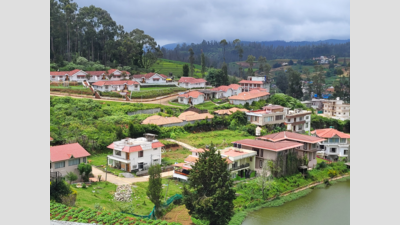ARTICLE AD BOX

Bed and breakfasts in Ooty get a wake-up call
Every few days, S Geetha logs on to the Tamil Nadu tourism department website, hoping to register her Ooty homestay. “But the portal just doesn’t seem to work. I’ve been trying for months,” she says.It’s not just Geetha who’s confused. The tourism department itself seems unsure how to handle the state’s homestay and bed-and-breakfast (B&B) sector, which has been mushrooming across hill stations.Over the past few years, the govt has repeatedly changed its stance on regulating homestays, first promoting them as immersive experiences that showcase local customs, cuisine and attractions, then tightening controls after environmental objections, leaving operators unsure of what rules apply and district administrations struggling to enforce regulations.
In 2022, the govt introduced registration and classification guidelines, leading to 942 licences being issued statewide; 565 were in the Nilgiris and 300 in Kodaikanal. But environmentalists protested that the unchecked spread of homestays in eco-sensitive zones threatened the ecology of the region and violated earlier court orders for scientific studies to be conducted before permits were issued. Consumer groups said it strained water and infrastructure.
Then came a slew of PILs after which, in April, the Madras high court passed an order freezing registrations and renewals “until further notice”. The tourism department blocked its online portal, leaving hundreds of operators in limbo, including those who registered under the category three years ago and are now unable to renew their licences.Madras HC formed a committee, headed by district revenue officers (DRO), district tourism officer and officials from revenue and local bodies, such as the executive officer, block development officer and municipal commissioner, to identify illegal cottages, homestays and B&Bs in the Nilgiris and Kodaikanal.Now, an affidavit submitted by the Nilgiris district administration to the court says 945 illegal cottages and resorts have been identified, and the process of issuing notices to them is underway. “Over the past three months, we have sealed at least 25 buildings that were operating illegally, primarily as resorts, with one being a homestay and another a B&B,” says M Narayanan, Nilgiris DRO.He adds that the recent building sealing drive targeted those operating without registration as B&Bs or homestays, as well as commercial resorts functioning within residential areas.
“Some were found to be unauthorised. Our focus is on shutting down unauthorised buildings that operate as resorts and homestays. We will then look at commercial resorts functioning in residential structures, followed by establishments that violate building regulations.
”In one instance, the inspection team found that a B&B sanctioned for six rooms was using a single licence to run three units with 18 rooms within the same complex.
“The building was sealed,” says Narayanan.It was also found that several commercial resorts that had obtained permits were operating in unauthorised buildings, 80% of them from residential buildings. Some buildings also violated building regulations, despite having obtained commercial licenses to operate resorts. For example, an 8,500sqft building was licensed for just 2,500sqft. “We identified 47 more buildings across the district functioning as resorts or cottages violating regulations.
We will take action on them as per the court order. We hope these issues will get streamlined,” says Narayanan.A senior tourism department official says most B&Bs and homestays are registered with the department, though some owners are awaiting licence renewals. “The association of B&B and homestay owners has 544 registered members,” the official says.He says “a Tamil Nadu Tourism Act is being drafted”. According to the official, one of the problems is that private inspection agencies have been appointed to classify establishments as silver or gold based on their facilities.
In some cases, while the properties met classification criteria, buildings were found to be illegal. “The govt should have included officials in the inspection panels for accountability.
”Illegal constructions are sometimes enabled by local officials, says V Sivadas, managing trustee of NEST, an environmental and social organisation in Ooty. “Along with sealing illegal properties, the district administration should also hold the responsible local officials accountable.”Meanwhile, operators such as Geetha say they are left hanging. “I just don’t know what I’m supposed to do now.”Home rulesResort: A commercial complex of units let out for tourists and guestsCottage: A commercial unit let out for guests and touristsHomestay establishment: When the owner/promoter resides in the same premises for providing the necessary services to visitors/guests. The establishment would have a minimum of one lettable room and a maximum of three lettable rooms (6 beds)Bed and Breakfast establishment: Premises including buildings in a plantation where the owner/promoter of the establishment does not reside at the establishment himself/herself, but an Agent or operator so designated by him/her resides in the establishment premises for providing the necessary services to the visitors/guests. The establishment would have a minimum of one lettable room and a maximum of six lettable rooms (12 beds)

 3 hours ago
5
3 hours ago
5









 English (US) ·
English (US) ·